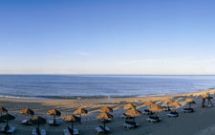500 years of Camões
Portugal - where love and the sea are everlasting
Embark on a journey that celebrates the 500th anniversary of famous Portuguese poet Luís Vaz de Camões’ birth. Discover the timeless spirit of the country, where tradition and change coexist in harmony. Feel the intensity of the love and the vastness of the sea that inspired Camões' verses.
Camões and the sea
Portugal is a gateway to the Atlantic, where the sea plays as great a role in life as the land itself. The rhythm of the waves, the horizon, and the salty breeze - these were the forces that inspired Camões' work. In “The Lusiads”, Luís de Camões described the departure of Portuguese ships from Lisbon to India, but you can feel the same spirit of discovery in other seaside locations, such as in Sagres, where navigators once stood on the edge of the unknown, or in Sines, the birthplace of Vasco da Gama, a historical figure and central character in Camões’ epic poem.
Beyond enticing sailors, Portugal provides countless opportunities for nature and adventure lovers. From surfing in various hotspots from the very north to the very south of the country to sailing along the Portuguese coast, every traveller is able to experience the relationship between Portugal and the sea. Here, the ocean is so much more than a backdrop - it’s a presence, a reminder of the role played the country’s history.
The poet's pathways
For literature lovers, Portugal offers a journey through time, where each town and monument reveals stories and tributes to the famous poet. Lisbon, where Camões lived and died, is the perfect starting point for a journey in search of his memories. In the heart of the city, places like the Camões Library, located in Largo do Calhariz, celebrate the poet’s name by means of a cultural collection that keeps his legacy alive. The Santa Catarina Viewpoint - known as the Adamastor Viewpoint because of the sculpture of the giant personifying the Cape of Good Hope placed there - is a symbol of the forces of nature that Camões described with such vigor. Very close by, a statue pays tribute to the poet in Luís de Camões Square - a meeting point in the charming Chiado neighborhood - immortalising his contribution to Portuguese literature.
In Baixa, when walking along Rua das Portas de Santo Antão, go down the Pátio do Tronco alley, where Camões was arrested, a place signalled with a tile panel paying homage to the poet. Going up Calçada de Santana, you’ll find the house where it is believed that Camões spent his last days - number 139.
On your way to the Belém neighborhood, visit the National Museum of Ancient Art, which houses an exceptional collection of Portuguese art, including paintings, sculptures, and decorative art from the medieval and Renaissance periods. Take your time immersing yourself in works depicting scenes from “The Lusiads” and gain a deeper appreciation of the visual representations of Camões’ epic.
In Belém, the Jerónimos Monastery is an architectural masterpiece and a symbol of Portuguese maritime discoveries. Built in the Manueline style, this UNESCO World Heritage Site is closely linked to Camões' work “The Lusiads”. Take your time appreciating the details on the façade and explore its beautiful interior, including the tombs of Luís de Camões and Vasco da Gama.
Just a few steps from the Jerónimos Monastery, you’ll find the iconic Belém Tower, which once guarded the entrance to the city's port. This place stood witness to the arrivals and departures of many of the navigators mentioned in "The Lusiads". Climb to the top to enjoy panoramic views over the Tagus River and reflect on the historical importance of Portugal's maritime past. Don't forget to hop in the lift that takes you up to the top of the Monument to the Discoveries, overlooking the Tagus River, which celebrates significant figures from Portugal’s era of sea voyages, and where Camões is also represented.
Although Lisbon is most often cited as the poet’s birthplace, some argue that Camões was born in Chaves. The Camões route through Chaves takes visitors through several places of historical and cultural importance, including Camões Square, the Museum of the Flavian Region – housed in the Paço dos Duques de Bragança, it preserves local history and the possible legacy left by the poet in the region – and the keep of the old medieval castle, a point of both observation and memory that takes visitors back to the historical context in which he would have lived and written.
It is also believed that Camões studied in Coimbra, perhaps at the Monastery of Santa Cruz, alongside some of the greatest thinkers of the time. Sprawling on the banks of the Mondego and alive with the spirit of its university, Coimbra reflects the spirit of youth and discovery that marks the poet's early years. Walking through the city is like going back to the time when the poet took his first steps in literature and thought.
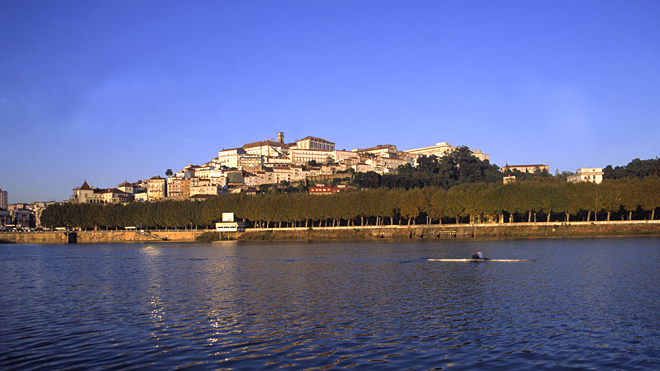
Camões’ memory can still be found in towns such as Constância, where he is said to have lived. As you stroll through the narrow streets of the riverside area, you’ll feel like you’ve stepped back in time, surrounded by the same landscapes and architecture that inspired the poet’s verses. The “Pomonas Camonianas” are held annually on the 10th June - a festival through which the town pays homage to its Poet. Visit the Camões Garden, which is home to 52 botanical species mentioned in the poet’s lyrical work and in "The Lusiads".
For fans of "The Lusiads" and the history of Portugal, a visit to Aljubarrota provides a journey into the essence of Portuguese heroism celebrated by Camões. Start at the CIBA – Interpretation Centre of the Battle of Aljubarrota and head to the Battlefield, where the poet celebrates Nuno Álvares Pereira. Continue past the Batalha Monastery, built in honour of the 1385 victory, and explore the Batalha Museum for a deeper insight into notable historical events. In the centre of Aljubarrota, come into contact with the legend of the Baker of Aljubarrota - a figure of resistance who echoes the spirit of freedom and courage that permeates Camões' work.
The 10th June 1580 marked Camões’ death - a date that is now celebrated as Day of Portugal, Camões, and the Portuguese Communities.
To celebrate the 500th anniversary of Camões’ birth, discover the legacy of a poet whose words captured the essence of being Portuguese and went on to flourish over the centuries. Experience the spirit of Portugal through books and writers, where tradition and innovation coexist, and where the poet's work is a springboard for your own journey of discovery.


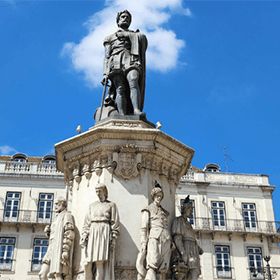
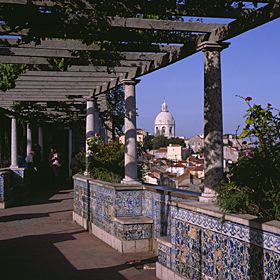
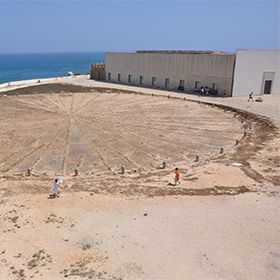
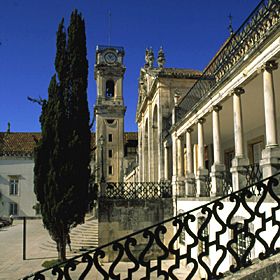

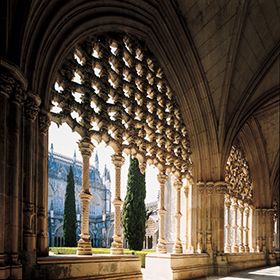


 Explore
Explore 
 Remember and Share
Remember and Share 

